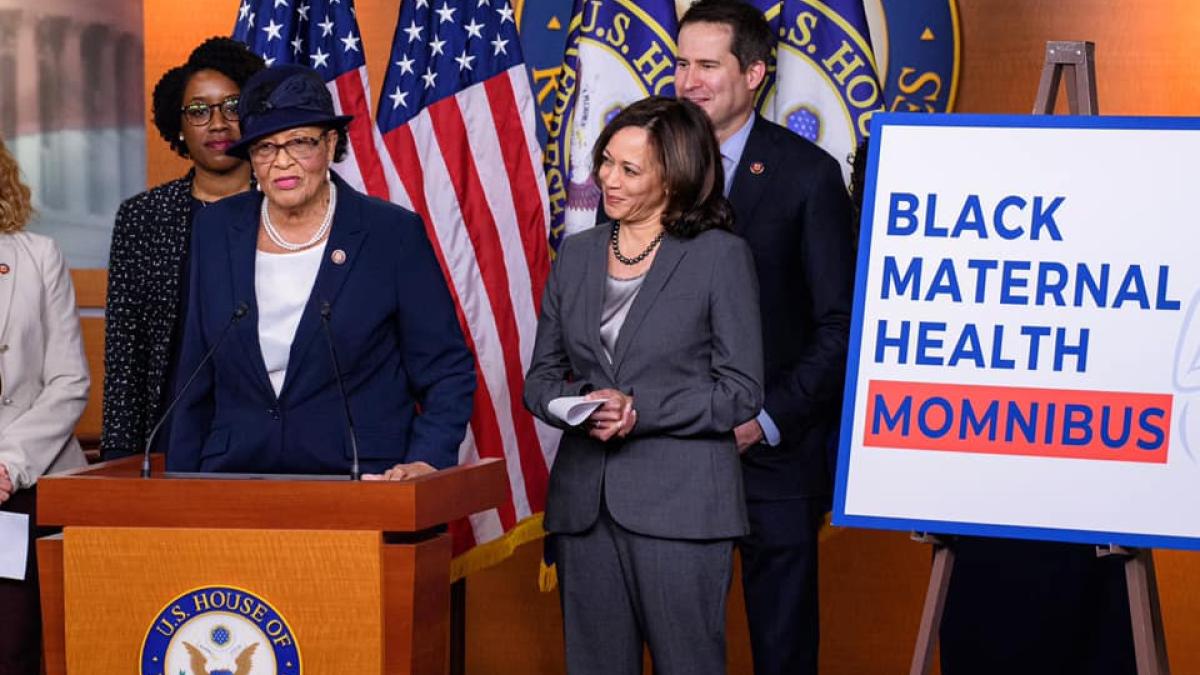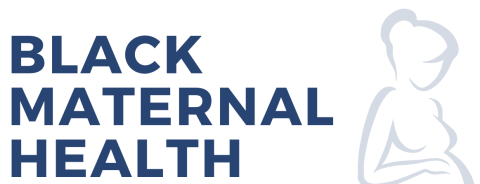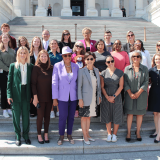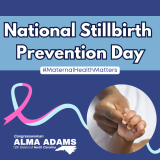Black Maternal Health


Martin Luther King, Jr., said, “of all the forms of inequality, injustice in healthcare is the most shocking and inhumane.” The United States has the worst maternal health outcomes, including mortality and morbidity, out of all other developed nations. Black women are three to four times more likely to die from a pregnancy-related complication compared to white women. That’s why Congresswoman Adams founded the Black Maternal Health Caucus and why she fights for the Momnibus, a package of 12 bills focused on improving maternal health outcomes and closing the disparity gap.
In 2021, Congressional leaders (Rep. Alma Adams, Rep. Lauren Underwood, and Senator Cory Booker) introduced a resolution recognizing April 11-17th as Black Maternal Health Week. The original Black Maternal Health Week resolution was inspired by the Black Mamas Matter Alliance – a powerful Black-women led coalition of advocates, activists, and community-based organizations. In 2018, it was introduced by Rep. Adams and then-Senator Kamala Harris, which eventually influenced the founding of the Black Maternal Health Caucus, co-chaired by Rep. Lauren Underwood, and the development of the Black Maternal Health Momnibus Act.
After the introduction of the Momnibus in 2020 and again in 2021, state legislators and state leaders across the country announced plans and introduced similar legislation to address the maternal mortality crisis and disparities in maternal health care in the United States.
The month of April is also recognized in the United States as National Minority Health Month – a month-long initiative to advance health equity across the country on behalf of all racial and ethnic minorities.
Black Maternal Health Week is a national campaign that was founded by the Black Mamas Matter Alliance. It is a week of awareness, activism, and community building intended to:
- Deepen the national conversation about Black maternal health in the US;
- Amplify community-driven policy, research, and care solutions;
- Center the voices of Black Mamas, women, families, and stakeholders;
- Provide a national platform for Black-led entities and efforts on maternal health, birth and reproductive justice; and
- Enhance community organizing on Black maternal health.
The Black Maternal Health Caucus
The Black Maternal Health Caucus is organized around the goals of elevating the Black maternal health crisis within Congress and advancing policy solutions to improve maternal health outcomes and end disparities.
History
Congresswomen Alma Adams (NC-12) and Lauren Underwood (IL-14) launched the Black Maternal Health Caucus on April 9th, 2019. With 53 founding members, the Caucus has grown to be one of the largest bipartisan caucuses in Congress, with more than 100 members as of January 2020.
"Racial disparities in maternal health have not improved in three decades. Regardless of educational attainment and income, Black women and their children are at risk. As a Black mother and grandmother, I’m proud to launch the Black Maternal Health Caucus to ensure that Black women and infants have the rights, respect, and resources to thrive before, during, and after pregnancy." - Black Maternal Health Caucus Founder & Co-Chair Rep. Alma Adams
“It’s both alarming and unacceptable that maternal mortality rates continue to rise in the United States, and the situation is even worse for Black women, who are three to four times more likely to die. Simply put, this issue affects too many women and families and will take a comprehensive approach to end. I’m honored to work with my colleagues in Congress and partners in industry, nonprofits, and the Administration to find solutions to ending disparities and achieving optimal birth outcomes for all families.” - Black Maternal Health Caucus Founder & Co-Chair Representative Lauren Underwood
Black Maternal Health Accomplishment
- Successfully pushed to include the Momnibus (H.R. 959 / S.346) in President Biden’s Build Back Better Act which will now provide more than $1.1 billion to address the maternal health crisis.
In Her Own Words
"In Congress, I think a lot about my daughter Jeanelle. She is an educator and mother herself, but she also faced numerous challenges, including a crisis during her pregnancy that inspired me to work with my colleague Lauren Underwood to start the first ever Black Maternal Health Caucus in Congress. Because despite all our progress, women are still fighting for equal health care, equal pay, equal representation, equal respect, and equal rights." Alma Adams
Black Maternal Health
Black women-led organizations, community groups and community-based perinatal workers (like doulas, midwives, lactation consultants) have been on the ground, doing the work of providing culturally-sensitive and affirming care to Black women.
The United States has the worst maternal health outcomes, including mortality and morbidity, out of all other developed nations.
Black women are 3-4 times more likely to die from a pregnancy-related complication compared to white women. In some communities, the disparity is even greater.
The COVID-19 pandemic has made things worse. More than 83,000 pregnant women in the United States have been diagnosed with COVID-19, and more than half were women of color.
For decades, the US maternal mortality and morbidity rates have gotten worse for all mothers, but especially for Black women whose health outcomes are further compounded by systemic and structural racism.
The status quo is unacceptable, which is why policymakers in Congress like Rep. Adams, and in state legislatures across the country, have drafted and introduced bills like the Black Maternal Health Momnibus Act.
The Momnibus is a 12-part bill that centers Black women and will fill gaps in existing legislation to comprehensively address every dimension of the Black maternal health crisis in America.
With the Momnibus, we’ve designed a roadmap to help our healthcare system, healthcare providers, regulators, lawmakers, and society to finally make Black maternal and infant health a priority.
The Black Maternal Health Momnibus Act will:
- Make critical investments in social determinants of health that influence maternal health outcomes, like housing, transportation, and nutrition.
- Provide funding to community-based organizations that are working to improve maternal health outcomes and promote equity.
- Comprehensively study the unique maternal health risks facing pregnant veterans and support VA maternity care coordination.
- Grow and diversify the perinatal workforce to ensure every mom in America receives maternity care and support from people they can trust.
- Improve data collection processes and quality measures to better understand the causes of the maternal health crisis in the United States and inform solutions to address it.
- Invest in programs to expand access to treatments and support for maternal mental health conditions and substance use disorders.
- Improve maternal health care and support for incarcerated moms.
- Invest in digital tools like telehealth to improve maternal health outcomes in underserved areas.
- Promote innovative payment models to incentivize high-quality maternity care and continuity of health insurance coverage from pregnancy through labor and delivery and up to 1 year postpartum.
- Strengthen programs to improve maternal health during COVID-19 and future public health emergencies.
- Invest in community-based initiatives to reduce levels of and exposure to climate change-related risks for moms and babies.
- Promote maternal vaccinations to protect the health and safety of moms and babies.








